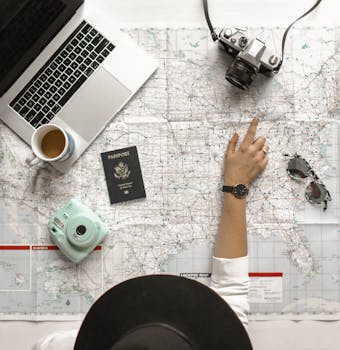Preparing for an immigration application can feel overwhelming—especially when you’re dealing with a maze of paperwork, translation requirements, and government-specific forms. One missing document can delay or even derail your entire visa process. Whether you’re applying for a student visa, work permit, family sponsorship, or permanent residency, your success depends on how well-prepared you are before you hit “submit.”
This guide offers a personalized document preparation checklist for the most common immigration types—tailored by country. Use it as your starting point to avoid surprises, stay organized, and move forward with confidence.
United States
The U.S. has one of the most document-intensive immigration systems in the world. Here’s a core checklist most applicants will need, depending on visa type:
- Valid passport (with 6+ months validity)
- Completed application form (e.g., DS-160 for nonimmigrant visas, I-130 or I-485 for family-based immigration)
- Passport-style photos (2×2 inches, per strict specifications)
- Filing fee payment receipt
- Birth certificate (with certified English translation if applicable)
- Marriage certificate (if applying as a spouse)
- Police clearance (for green card applicants)
- Medical exam results (from USCIS-approved doctors)
- Proof of financial support (e.g., I-864 Affidavit of Support)
- Employment offer or sponsor letter (if applicable)
- Education transcripts and diplomas (for student or skilled work visas)
- Visa interview appointment confirmation (for consular processing)
Pro tip: Always keep digital and hard copies of everything, and double-check expiration dates on documents.
Canada
Canada’s system relies heavily on online document uploads through portals like Express Entry and IRCC accounts.
Typical required documents:
- Passport bio page
- Education Credential Assessment (ECA)
- Language test results (IELTS or CELPIP)
- Proof of work experience (reference letters, pay stubs)
- Police certificates from every country lived in for 6+ months
- Medical exam confirmation
- Proof of funds (bank statements covering 6 months)
- Marriage/birth certificates (for family members)
Additional tip: All documents not in English or French must include certified translations.
United Kingdom
The UK’s immigration process is increasingly digitized, but your application must still be airtight. Common documents include:
- Valid passport and previous travel documents
- Biometric information (uploaded via mobile app or collected at a center)
- Proof of English language proficiency (IELTS or equivalent)
- Certificate of Sponsorship (for work visa applicants)
- Proof of relationship (for spouse/partner visas)
- Tuberculosis test results (from an approved clinic)
- Bank statements or sponsor documentation (for financial support)
Common pitfall: Submitting bank documents without a clear transaction history or incorrect formatting.
Australia
Australia’s Department of Home Affairs requires all documentation to be high-resolution scans, uploaded with exact file naming standards.
Checklist examples:
- National ID and passport
- Certified copy of birth certificate
- Police checks from every country lived in
- Skills assessment (for work-based immigration)
- Proof of health insurance (mandatory for most visa types)
- Medical and x-ray examination records
- Marriage or de facto relationship evidence (shared bills, leases, photos)
- Form 80 (character assessment form)
Don’t forget: Every uploaded document must be in color and readable—blurry or cropped files will cause delays.
Germany
For long-term national visas (e.g., study, work, or family reunification), Germany requires:
- Completed visa application forms
- Valid passport (with at least 2 blank pages)
- Biometric photos
- Proof of accommodation in Germany
- Proof of financial resources (blocked account, scholarship letter, or job offer)
- Health insurance certificate
- Academic diplomas or work contracts
Tip: Keep two physical copies of your full application for consular interviews.
Portugal
Portugal’s visa process can vary slightly depending on your consulate and the purpose of the move (e.g., D7, Golden Visa, family reunification).
Typical documentation:
- Passport copy
- NIF (Portuguese tax number)
- Proof of accommodation (rental agreement or invitation letter)
- Proof of income or pension
- Criminal record from country of origin
- Private health insurance
- Bank statements and proof of transfer to Portuguese bank
Useful note: The NIF is often required before submitting your visa application. Work with a local lawyer or relocation consultant if needed.
Thailand
For long-stay visas like retirement or marriage visas, applicants will need:
- Passport valid for at least 12 months
- Thai bank book and letter from bank (for financial proof)
- Police clearance from home country
- Marriage certificate and spouse’s Thai ID (if applicable)
- Health certificate (from local Thai hospital)
Check with your consulate: Some documents must be notarized or legalized in advance.
General Tips for All Applicants
- Create a Digital Folder Structure: Organize by type (identity, finances, education, health) and ensure consistent file naming.
- Check Validity Windows: Some documents expire quickly—like police clearances or bank statements.
- Hire a Certified Translator: For any non-English materials, use government-recognized translators.
- Scan in High Quality: Poor scan quality is one of the most common reasons for rejection.
- Include a Cover Letter or Index Page: Especially helpful when submitting a paper application or package.
How to Use a Checklist Generator
Instead of guessing, consider using online tools or services that generate country-specific checklists. Some embassy websites offer interactive forms that produce a tailored list based on your visa type, family situation, and destination. These tools often:
- Reduce human error
- Keep pace with document policy changes
- Include uploading or format instructions
A strong immigration application starts with document organization. Knowing exactly what you need—and in what format—can mean the difference between approval and rejection. With the right tools and preparation strategy, you can move forward with clarity and peace of mind.
If you’re unsure what your visa type requires, consult an immigration attorney or trusted visa consultant. Or use one of the emerging checklist generators now available through national immigration portals or trusted expat platforms. Your future may depend on what you upload today.


